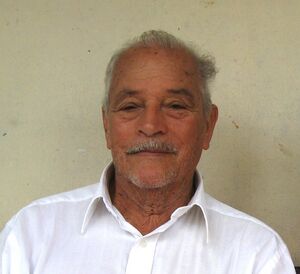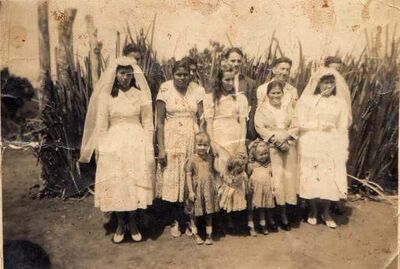Difference between revisions of "Cardona Tabares, Gildardo (1929-2020)"
| [checked revision] | [checked revision] |
AlfRedekopp (talk | contribs) |
AlfRedekopp (talk | contribs) |
||
| Line 2: | Line 2: | ||
__TOC__ | __TOC__ | ||
[[File:Jiguales finca 21 Gildardo Cardona 28.09.2010.jpg|300px|thumb|right|''Gildardo Cardona, 2010. <br>Photo: courtesy of Elizabeth Miller'']] | [[File:Jiguales finca 21 Gildardo Cardona 28.09.2010.jpg|300px|thumb|right|''Gildardo Cardona, 2010. <br>Photo: courtesy of Elizabeth Miller'']] | ||
| − | Gildardo Cardona Tabares: [[ | + | Gildardo Cardona Tabares: farmer and pastor of the Mennonite Brethren Churches of Colombia ([[Iglesias Hermanos Menonitas de Colombia]]); born 19 July 1929 to Aníbal Cardona and Adelaida Tabares Burgo. Resided in Jiguales, Valle del Cauca, [[Colombia]]. Gildardo married Blanca Stella Motato in 1958 and they had ten children, including Mennonite Brethren pastor Doris Cardona. He died 11 July 2020. |
In 1953, Gildardo heard the sermons of some traveling preachers who passed through the rural hamlet of Jiguales where he lived. Although Gildardo did not listen closely to their sermons, afterwards he dreamed of angels coming down from heaven. This dream stuck with him so much that, once he awoke, he read the Bible from start to finish. Still Gildardo was not satisfied. So he read the Bible three more times and began to attend the nearest evangelical church he could find–the Mennonite Brethren church in La Cumbre. In April 1958, Gildardo and his wife, Blanca Motato, were baptized by missionary Ebner Friesen. By this time Gildardo and Blanca already had three young children, but since their marriage was a civil union–common in rural areas at that time–the Mennonite Brethren missionaries first requested that they marry legally, before being baptized. Gildardo and Blanca’s marriage was one of the first in the region to be officiated by a judge, rather than the local Catholic priest. | In 1953, Gildardo heard the sermons of some traveling preachers who passed through the rural hamlet of Jiguales where he lived. Although Gildardo did not listen closely to their sermons, afterwards he dreamed of angels coming down from heaven. This dream stuck with him so much that, once he awoke, he read the Bible from start to finish. Still Gildardo was not satisfied. So he read the Bible three more times and began to attend the nearest evangelical church he could find–the Mennonite Brethren church in La Cumbre. In April 1958, Gildardo and his wife, Blanca Motato, were baptized by missionary Ebner Friesen. By this time Gildardo and Blanca already had three young children, but since their marriage was a civil union–common in rural areas at that time–the Mennonite Brethren missionaries first requested that they marry legally, before being baptized. Gildardo and Blanca’s marriage was one of the first in the region to be officiated by a judge, rather than the local Catholic priest. | ||
| Line 10: | Line 10: | ||
Like many rural pastors, Gildardo also worked as a farmer.. He raised livestock and grew many crops, including coffee, to support his family. He also used his skills as a carpenter to build churches and adjacent church-supported primary schools, including in Jiguales. While serving at Villa Hermosa, Gildardo considered retiring from ministry, due to the dwindling membership in the church there. The Mennonite Brethren population in urban areas grew rapidly in the 1960s, but rural churches like Gildardo's struggled as members moved to the cities for work and schooling. | Like many rural pastors, Gildardo also worked as a farmer.. He raised livestock and grew many crops, including coffee, to support his family. He also used his skills as a carpenter to build churches and adjacent church-supported primary schools, including in Jiguales. While serving at Villa Hermosa, Gildardo considered retiring from ministry, due to the dwindling membership in the church there. The Mennonite Brethren population in urban areas grew rapidly in the 1960s, but rural churches like Gildardo's struggled as members moved to the cities for work and schooling. | ||
| − | Before retiring, however, Gildardo was transferred to serve as pastor in Cisneros, where he continued for over ten years. He enjoyed his years of ministry in Cisneros, and both he and Blanca were appreciated by the congregation there. Gildardo then moved back to Jiguales and quickly retired. The | + | Before retiring, however, Gildardo was transferred to serve as pastor in Cisneros, where he continued for over ten years. He enjoyed his years of ministry in Cisneros, and both he and Blanca were appreciated by the congregation there. Gildardo then moved back to Jiguales and quickly retired. The denomination, however, called him out of retirement to pastor the Mennonite Brethren Church in La Cumbre. Throughout his ministry, Gildardo regularly attended regional church meetings in Cali at least once a month wherever he was stationed, despite the burden of travel. After ten years of pastoring in La Cumbre, he retired for the final time and returned to live on his farm. Gildardo Cardona Tabares’s willingness to serve in pastoral ministry and his humble leadership style made him extremely trusted among the Colombian Mennonite Brethren rural community. |
See also: [[Cardona Tabares, Gildardo (1929-2020) (ES)]] | See also: [[Cardona Tabares, Gildardo (1929-2020) (ES)]] | ||
Revision as of 12:50, 28 September 2023
Gildardo Cardona Tabares: farmer and pastor of the Mennonite Brethren Churches of Colombia (Iglesias Hermanos Menonitas de Colombia); born 19 July 1929 to Aníbal Cardona and Adelaida Tabares Burgo. Resided in Jiguales, Valle del Cauca, Colombia. Gildardo married Blanca Stella Motato in 1958 and they had ten children, including Mennonite Brethren pastor Doris Cardona. He died 11 July 2020.
In 1953, Gildardo heard the sermons of some traveling preachers who passed through the rural hamlet of Jiguales where he lived. Although Gildardo did not listen closely to their sermons, afterwards he dreamed of angels coming down from heaven. This dream stuck with him so much that, once he awoke, he read the Bible from start to finish. Still Gildardo was not satisfied. So he read the Bible three more times and began to attend the nearest evangelical church he could find–the Mennonite Brethren church in La Cumbre. In April 1958, Gildardo and his wife, Blanca Motato, were baptized by missionary Ebner Friesen. By this time Gildardo and Blanca already had three young children, but since their marriage was a civil union–common in rural areas at that time–the Mennonite Brethren missionaries first requested that they marry legally, before being baptized. Gildardo and Blanca’s marriage was one of the first in the region to be officiated by a judge, rather than the local Catholic priest.
Soon after his marriage and baptism, Gildardo was called into ministry. He first began pastoring in 1958 in San José. The family continued living on their farm in Jiguales, while Gildardo regularly traveled between Jiguales and San José by horseback (a distance of a few hours), dividing his time among farm, family, and the church plant in San José. With the encouragement and support of Mennonite Brethren leader Daniel Duque, Gildardo also took correspondence courses from the Academia Cristiana del Aire; he received his diploma in 1959. After three years Gildardo left the position in San José and returned to the farm in Jiguales. Soon after, he was appointed pastor at the church in Jiguales, known as Villa Hermosa.
Like many rural pastors, Gildardo also worked as a farmer.. He raised livestock and grew many crops, including coffee, to support his family. He also used his skills as a carpenter to build churches and adjacent church-supported primary schools, including in Jiguales. While serving at Villa Hermosa, Gildardo considered retiring from ministry, due to the dwindling membership in the church there. The Mennonite Brethren population in urban areas grew rapidly in the 1960s, but rural churches like Gildardo's struggled as members moved to the cities for work and schooling.
Before retiring, however, Gildardo was transferred to serve as pastor in Cisneros, where he continued for over ten years. He enjoyed his years of ministry in Cisneros, and both he and Blanca were appreciated by the congregation there. Gildardo then moved back to Jiguales and quickly retired. The denomination, however, called him out of retirement to pastor the Mennonite Brethren Church in La Cumbre. Throughout his ministry, Gildardo regularly attended regional church meetings in Cali at least once a month wherever he was stationed, despite the burden of travel. After ten years of pastoring in La Cumbre, he retired for the final time and returned to live on his farm. Gildardo Cardona Tabares’s willingness to serve in pastoral ministry and his humble leadership style made him extremely trusted among the Colombian Mennonite Brethren rural community.
See also: Cardona Tabares, Gildardo (1929-2020) (ES)
Bibliography
Cardona Motato, Doris. “Biografía de Gildardo Cardona.” Personal email to Elizabeth Miller (26 Sept 2023).
Cardona Tabares, Gildardo. Interview by Elizabeth Miller. Jiguales, Valle del Cauca, Colombia (28 Sept 2010).
Cardona Tabares, Gildardo. Interview by Jaime Prieto. La Cumbre, Valle del Cauca, Colombia (2 Oct 1999). Institute for the Study of Global Anabaptism, Goshen College, Goshen, IN.
Miller, Elizabeth. Desde el principio anabautistas: la historia de las iglesias menonitas y hermanos menonitas en Colombia, 1946-1975. Bogotá: Editorial Gente Nueva SAS, 2022.
| Author(s) | Montce Martinez Alvarez |
|---|---|
| Date Published | 27 Sep 2023 |
Cite This Article
MLA style
Martinez Alvarez, Montce. "Cardona Tabares, Gildardo (1929-2020)." Global Anabaptist Mennonite Encyclopedia Online. 27 Sep 2023. Web. 2 Feb 2026. https://gameo.org/index.php?title=Cardona_Tabares,_Gildardo_(1929-2020)&oldid=177621.
APA style
Martinez Alvarez, Montce. (27 Sep 2023). Cardona Tabares, Gildardo (1929-2020). Global Anabaptist Mennonite Encyclopedia Online. Retrieved 2 February 2026, from https://gameo.org/index.php?title=Cardona_Tabares,_Gildardo_(1929-2020)&oldid=177621.
©1996-2026 by the Global Anabaptist Mennonite Encyclopedia Online. All rights reserved.

